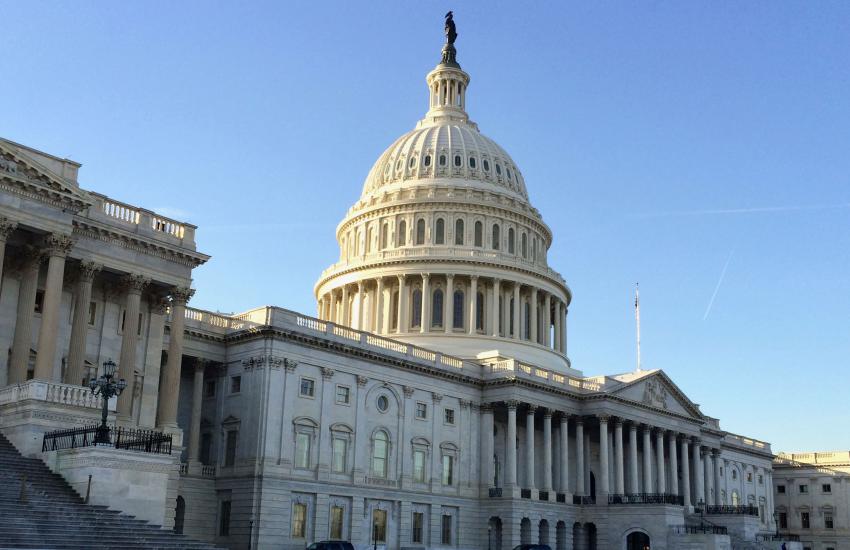National Security Commission for Emerging Biotechnology Sounds the Alarm
Like other commissions set up by Congress—such as the Cyberspace Solarium Commission that provided crucial cybersecurity measures—the National Security Commission on Emerging Biotechnology (NSCEB) was created to examine tough problems.
How can the United States support a whole-of-government approach to harnessing emerging biotechnology while increasing national security and risks from adversaries from bio-related threats is the main question that the NSCEB is considering, explained Paul Arcangeli. He is one of the 11 commissioners of the bipartisan commission created by the National Defense Authorization Act (NDAA) of Fiscal Year 2022, led by the chair of the commission, Sen. Todd Young (R-Indiana).
The commission is also examining how the Department of Defense (DoD) can harness emerging biotechnologies and protect against biotechnological threats from adversaries such as the People’s Republic of China.
The United States and its allies must play a leading role in shaping the future of biotechnology, Arcangeli said.
“This is the biotechnology age—we are in it,” said Arcangeli in an interview with SIGNAL Media. “Our adversaries recognized it very quickly in the early 2000s and have made incredible efforts to build biotech economies. Biotechnology is going to change everything in a lot of ways for all humans on earth, and whoever controls it is going to dictate not just what gets worked on, but also the rules and ethics that guide that work.”
A former Army explosive ordnance disposal specialist and a Signal officer, Arcangeli has worked on Capitol Hill for about 20 years, the last 12 as staff director of the House Armed Services Committee.
“We will fail in national security biotechnology if the wider biotechnology economy and ecosystem is not successful here in this country,” Arcangeli warned. “The genie is out of the bottle. Other countries are moving forward with biotech. And the idea that we might just ignore this is not [plausible].”
To act is no small task, as the United States faces many challenges. The U.S. regulatory framework alone is not set up to keep up with biotechnology advancements. The nation’s agriculture policy stems back 200 years and health care policy goes back 150 years. Both sometimes get in the way of innovation and technology, Arcangeli noted.
As a whole, the United States must tackle creating a robust ecosystem for emerging biotechnologies, increase bioliteracy and understanding of biotechnologies, tackle rules and regulations, and grow a biotechnology workforce, among other steps.
So far, the NSCEB has issued an interim report in December 2023, providing guidelines for taking some of these steps. They also have provided several white papers, statements, recommendations and policy briefs. A final report is expected to be released to the public in early 2025, Arcangeli shared.
The commission is urging Congress and DoD to fund military-related biotechnology efforts, especially in the FY 2025 NDAA. Arcangeli, with his experience on the House Armed Services Committee, sees how biotechnology has to compete for funding against other DoD programs.
“One of the problems that the Department of Defense has is that there are a lot of demands, and they compete with each other,” the commissioner noted. “And sometimes, the Department of Defense doesn’t see that investment in biotech will produce outcomes that they are seeking—imagining what it cannot imagine. It is breaking free of the legacy way and seeking new capabilities using a new process.”
The NSCEB has recommended that the DoD and Congress support emerging military-related biotechnologies such as bio-based materials, advanced health supplies and bio-based energy materials. Bio-based materials used in textiles or manufacturing could protect soldiers on the ground. The U.S. Army’s Living Materials program, for example, is researching biological materials that can cloak thermal signatures to disguise soldiers from heat-detecting cameras. For advanced health supplies, the Defense Advanced Research Projects Agency is developing field-deployable, shelf-stable whole blood equivalent for injured soldiers, the commission stated in a July 2024 report, Defending our Nation with Biotechnology.
Arcangeli sees a future where warfighters at the edge could produce biotechnology in remote locations. “We will be able to produce things all the way down at the pointy end of the spear,” he said. “We might be able to make it in a vat, using biotechnology and microbes to create something that we need all the way down at the front. This is a huge opportunity for supply chains, a huge opportunity for unique capabilities and chemicals. Just unlimited opportunities that we haven’t even started to scratch the surface of.”
This could even include food or other nourishment. “I saw a company that takes microbes and inserts a snippet of DNA into the microbe that is coated to produce milk protein,” he offered. The protein can then be grown and collected to make cheese or other “dairy” products. “But it is vegan, it was never in a cow,” Arcangeli noted. “And I can make it anywhere. I can make it in the desert without regard to cows.”
Advanced biocapabilities could also assist the DoD in environmental remediation, especially in response to dangerous per- and polyfluoroalkyl substances, known as PFAs. Biotechnologies could provide new methods for breaking down the pollutants or may offer safer alternatives, the commissioner shared.
“PFAs are an incredible problem because they are forever chemicals that never go away,” he explained. “The DoD used it in firefighting foam, so in every place that they trained for firefighting, PFAs show up. It was also used as a fire retardant in certain uniforms and certain kinds of safety equipment, and in plastics.”

On the data front, the NSCEB has recommended the establishment of a coordinated and sustainable data infrastructure with robust data collection and organization, well-maintained data storage and less fragmentation of information.
And while the United States has funded biological database development and management, this has largely been through the National Institutes of Health.
“These databases, however, are relatively small compared to the larger data assets of other countries like China,” the NSCEB stated in a July 2024 report. “The U.S. biotechnology industry needs sustainable data infrastructure to maximize the value and reusability of biological data. Like infrastructure for water, electricity and roads across the country, the United States needs a persistent biological data infrastructure to support biotechnology advancements.”
In addition, the NSCEB is recommending steps to change the national understanding and conversation around biotechnology. First, STEM education is needed around biotechnology at all levels, from elementary school through workforce development programs. The United States needs a workforce capable of developing advanced biotechnology and manufacturing.
“We are going to need a whole lot of people who can do the work of biotechnology and that can work in the places where biotechnology is going to be produced,” emphasized Arcangeli.
This effort must also include steps to improve the nation’s bioliteracy. “Our country is not bioliterate,” he continued. “We need to understand what biology can do, what it is doing and what it can do in the future. Otherwise, you are subject to all kinds of misdirection.”
In addition, that understanding has to recognize that the future of biotechnology is not going to be centered around health care. In fact, about 80% of biotechnology will encompass other fields outside of health care. It will include agriculture, manufacturing, environmental remediation and national defense.
As such, the United States must act now on a comprehensive approach. “This effort is not just about one thing,” the commissioner said. “This is not creating regulations to operate. This isn’t just about creating a workforce. It is not just dumping money into the Department of Defense and say, ‘Go buy biotech.’ It is a whole of government effort that we need to have. It is about looking at our existing rules and regulations, our existing oversight structure and trying to move it all into the 21st century.”




Comments